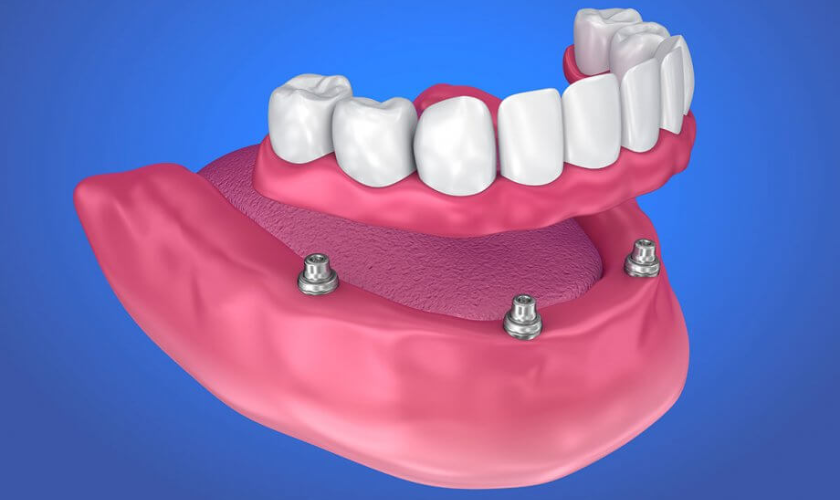
Implant-supported dentures are a modern dental solution designed to provide a secure, stable, and functional replacement for missing teeth. Unlike traditional dentures that rest on the gums and rely on adhesives for stability, implant-supported dentures are anchored directly to the jawbone using dental implants. This innovative approach offers numerous benefits, including improved comfort, enhanced chewing ability, and a more natural appearance.
Understanding Dental Implants
To fully appreciate the advantages of implant-supported dentures, it’s essential to understand dental implants. A dental implant is a small, screw-like post made of titanium or another biocompatible material. It is surgically inserted into the jawbone, where it acts as an artificial tooth root. Over time, the implant fuses with the bone through a process called osseointegration, creating a strong and stable foundation for the attachment of dental prosthetics, such as crowns, bridges, or dentures.
The Process of Getting Implant-Supported Dentures
The journey to obtaining implant-supported dentures typically involves several stages, each crucial for ensuring the success and longevity of the treatment:
- Initial Consultation: The process begins with a comprehensive dental examination and consultation. The dentist evaluates the patient’s oral health, bone density, and suitability for implants. Diagnostic tools like X-rays and CT scans are often used to assess the condition of the jawbone and plan the placement of the implants.
- Treatment Planning: Based on the assessment, a customized treatment plan is developed. This plan outlines the number of implants needed, their placement, and the type of denture that will be used. In some cases, bone grafting may be necessary if there is insufficient bone density to support the implants.
- Implant Placement: During a minor surgical procedure, the dental implants are placed into the jawbone. This procedure is typically performed under local anesthesia, though sedation options are available for patients who require them. After the implants are placed, a healing period of several months is necessary to allow osseointegration to occur.
- Attachment of Abutments: Once the implants have integrated with the jawbone, abutments (small connectors) are attached to the implants. These abutments protrude through the gums and serve as attachment points for the dentures.
- Fabrication and Placement of Dentures: Impressions of the mouth are taken to create custom dentures that fit securely onto the abutments. These dentures can be either fixed or removable. Fixed dentures, also known as implant-supported bridges, are permanently attached to the implants and can only be removed by a dentist. Removable dentures, on the other hand, can be taken out by the patient for cleaning and maintenance.
Types of Implant-Supported Dentures
There are two primary types of implant-supported dentures: bar-retained and ball-retained.
- Bar-Retained Dentures: In this type, a thin metal bar is attached to the implants, following the curve of the jaw. The denture fits over the bar and is secured using clips or other types of attachments. This provides a stable and secure fit, while still allowing the denture to be removed for cleaning.
- Ball-Retained Dentures: Also known as stud-attachment dentures, this type involves ball-shaped attachments (also called male attachments) on the implants that fit into corresponding sockets (female attachments) on the denture. This type of attachment provides a snug and secure fit, preventing the denture from slipping or moving during use.
Benefits of Implant-Supported Dentures
Implant-supported dentures offer numerous advantages over traditional dentures, making them an increasingly popular choice for patients seeking a reliable and long-term solution for missing teeth:
- Enhanced Stability and Comfort: Because they are anchored to the jawbone, implant-supported dentures provide a level of stability and comfort that traditional dentures cannot match. This stability eliminates the need for adhesives and reduces the risk of dentures slipping or causing discomfort.
- Improved Chewing Efficiency: With implant-supported dentures, patients can enjoy a more varied diet without the limitations often imposed by traditional dentures. The enhanced stability allows for more effective chewing and better digestion.
- Preservation of Jawbone Health: Dental implants stimulate the jawbone, helping to prevent the bone loss that typically occurs after tooth loss. This preservation of bone structure contributes to a more youthful facial appearance and overall oral health.
- Natural Appearance: Implant-supported dentures are designed to look and feel like natural teeth. They provide a more natural appearance and a confident smile, enhancing self-esteem and quality of life.
- Long-Term Durability: With proper care and maintenance, implant-supported dentures can last for many years, making them a cost-effective investment in long-term oral health.
Caring for Implant-Supported Dentures
Proper care and maintenance are essential for ensuring the longevity and functionality of implant-supported dentures. Here are some key tips for maintaining your implant-supported dentures:
- Daily Cleaning: Just like natural teeth, implant-supported dentures require daily cleaning to remove food particles and plaque. Use a soft-bristled toothbrush and non-abrasive toothpaste to clean around the implants, abutments, and denture surfaces.
- Regular Dental Check-Ups: Regular visits to the dentist are crucial for monitoring the health of the implants and surrounding tissues. Your dentist will check for any signs of inflammation, infection, or other issues that could affect the implants.
- Avoid Hard and Sticky Foods: While implant-supported dentures are more stable than traditional dentures, it’s still advisable to avoid excessively hard or sticky foods that could damage the dentures or implants.
- Use a Water Flosser: A water flosser can be a helpful tool for cleaning around the implants and removing debris from hard-to-reach areas.
- Follow Your Dentist’s Instructions: Adhering to your dentist’s recommendations and guidelines for care and maintenance will help ensure the success and longevity of your implant-supported dentures.
Implant-supported dentures represent a significant advancement in dental prosthetics, offering a stable, comfortable, and natural-looking solution for individuals with missing teeth. By combining the benefits of dental implants with the functionality of dentures, this innovative approach provides a long-term solution that enhances oral health, improves quality of life, and restores confidence. Whether you are considering implant-supported dentures for the first time or exploring options to improve your existing dental prosthetics, consulting with a qualified dental professional is the first step toward achieving a healthy and beautiful smile.


